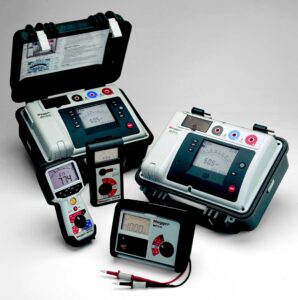Table of Contents
What is the Motor Megger Test?
The Motor Megger Test, also known as the Insulation Resistance Test, is a diagnostic procedure used to evaluate the integrity of the insulation in an electric motor. This test helps detect insulation weaknesses, contamination, or potential failure risks before they result in motor breakdowns or unsafe conditions.
Insulation resistance test is famous for the term megger related to the well-known company MEGGER.
“Megger a Motor” is technically impossible, And you can’t megger any motors! As megger is a registered trademark, not an electrical test, But in real life this expression is used when describing “electrical motor insulation resistance test”.
What is the purpose of the motor megger test?

The purpose of the Motor Megger Test, or Megger insulation test, is to assess the condition of the insulation system in electric motors and generators.
This test is important for several reasons:
-
Detecting Insulation Deterioration: Over time, the insulation materials used in motors and generators can degrade due to factors such as moisture, contaminants, thermal stress, and mechanical wear. The Megger test helps identify any deterioration in the insulation system before it progresses to a critical level.
-
Preventing Electrical Faults: Deteriorated insulation can lead to electrical faults such as short circuits, ground faults, and phase-to-phase faults. These faults can cause motor or generator malfunctions, equipment damage, and potentially hazardous situations. By detecting insulation problems early, the test helps prevent these faults from occurring.
-
Extending Equipment Life: Regularly performing Megger tests and addressing any insulation issues found can extend the operational lifespan of motors and generators. Timely maintenance and repairs can prevent costly replacements and downtime.
-
Enhancing Safety: Motors and generators with compromised insulation can pose safety risks, including electrical shock hazards and fire hazards. Identifying and rectifying insulation problems through the Megger test contributes to overall electrical safety.
-
Minimizing Unscheduled Downtime: Unexpected motor or generator failures can disrupt operations and lead to production losses. By proactively assessing insulation integrity, the Megger test helps reduce the likelihood of unplanned downtime and production interruptions.
-
Optimizing Maintenance: The results of Megger tests can guide maintenance decisions. For example, if a motor’s insulation resistance is decreasing over time, it may indicate the need for further inspections, cleaning, or repairs. Conversely, a motor with consistently high insulation resistance may not require immediate attention.
-
Compliance with Standards: In many industries and applications, there are specific standards and regulations that require regular insulation resistance testing as part of a maintenance program. Adhering to these standards is essential for compliance and safety.
For more details aboutmotor insulation read my article here.
When Should You Megger a Motor?
Megger testing of a motor should be conducted at specific intervals as part of a regular maintenance program.
The timing of these tests can vary depending on factors such as the type of motor, its application, and environmental conditions. Here are some general guidelines on when to Megger a motor:
-
During Commissioning: Megger testing is typically performed during the initial commissioning of a new motor to establish a baseline for insulation resistance. This helps ensure that the motor is in good condition from the start.
-
Scheduled Maintenance: Regularly scheduled maintenance intervals are the most common times to perform Megger tests on motors. The frequency of these tests can vary but is often done annually or semi-annually.
-
After Exposure to Harsh Conditions: If a motor has been exposed to harsh environmental conditions, such as extreme temperatures, moisture, or contaminants, it’s a good practice to conduct Megger tests to check for insulation deterioration. Severe operating conditions can accelerate insulation degradation.
-
After Repairs or Rewinding: After any significant repairs or rewinding of motor windings, it’s essential to perform Megger tests to ensure the integrity of the insulation has been maintained or restored.
-
When Insulation Issues Are Suspected: If there are signs of motor performance issues, unusual noises, overheating, or erratic behavior, Megger testing should be performed to check for insulation problems. Suspected issues can warrant unscheduled tests.
-
Per Manufacturer’s Recommendations: Consult the manufacturer’s guidelines and recommendations for the specific motor in use. Manufacturers often provide recommendations for maintenance, including the frequency of Megger testing.
-
Compliance with Industry Standards: In some industries or applications, there are specific standards and regulations that dictate the frequency of Megger testing. Ensure compliance with these standards.
What Voltage Should You Megger a Motor?
The voltage at which you should Megger (insulation resistance test) a motor depends on the motor’s voltage rating. Here are general guidelines for selecting the appropriate Megger voltage for motor insulation testing:
-
Low-Voltage Motors (Up to 600 Volts): For motors that operate at voltages up to 600 volts, a 500V Megger is typically used for insulation resistance testing. This voltage level is suitable for most low-voltage motors.
-
Medium-Voltage Motors (Over 600 Volts to 6600 Volts): Motors that operate in the voltage range from 601 volts to around 6600 volts are considered medium-voltage motors. For these motors, it’s common to use a 1000V Megger for insulation resistance testing. This higher voltage is necessary to assess the insulation integrity of motors operating at higher voltage levels.
It’s crucial to adhere to these general guidelines, but there can be variations depending on specific motor applications, manufacturer recommendations, and industry standards.
Always consult the motor manufacturer’s guidelines or any applicable industry standards for the most accurate information regarding insulation resistance testing voltage for your particular motor.
What is acceptable megger reading for a motor?
The acceptable Megger reading for a motor’s insulation resistance can vary depending on factors such as the motor’s type, size, age, and operating conditions.
Insulation resistance values are typically measured in ohms (Ω), megohms (MΩ), or gigohms (GΩ) for high-resistance values.
The acceptable reading is generally relative and should be compared to previous readings or manufacturer recommendations.
Here are some general guidelines for acceptable Megger readings for motors:
-
New Motors: For newly installed or recently manufactured motors, insulation resistance readings are typically high and can often be in the range of several hundred megohms (MΩ) to gigohms (GΩ). High readings are generally a positive indicator of good insulation.
-
Aging Motors: As motors age, the insulation resistance tends to decrease due to factors like moisture absorption, thermal cycling, and contaminants. Acceptable values for older motors can vary, but readings above 1 MΩ are generally considered acceptable for many applications. However, it’s essential to consider the motor’s specific history and conditions.
-
Comparison to Previous Readings: The most reliable way to determine whether a Megger reading is acceptable is to compare it to previous readings taken during previous maintenance tests. A significant drop in insulation resistance over time may indicate a problem.
-
Manufacturer’s Recommendations: Consult the motor manufacturer’s guidelines or technical documentation for specific insulation resistance requirements. Some manufacturers may provide recommended minimum insulation resistance values for their motors.
-
Industry Standards: In some industries or applications, there may be industry-specific standards that define acceptable insulation resistance values. These standards should be followed if applicable.
-
Temperature Correction: Keep in mind that insulation resistance readings are affected by temperature. Ensure that the readings are corrected to a standard temperature if necessary, especially when comparing readings over time.
How Long Does a Megger Test Take?
As a rough estimate, a standard Megger test on a motor can take anywhere from a few minutes to around 15 minutes or more.
However, it’s important to note that the primary goal of the test is to obtain accurate and reliable insulation resistance measurements. Rushing through the test may result in less accurate results.
The specific test duration should be determined based on the equipment being tested, the test voltage, and any specific requirements or guidelines provided by the manufacturer or industry standards.
It’s also important to allow sufficient time for the Megger instrument to stabilize before recording readings. Additionally, for trend analysis and comparison with previous measurements, consistency in test duration is essential.
While the Megger test may take some time to complete, it is a valuable diagnostic tool for assessing the condition of electrical insulation, and the time invested in performing the test can help identify potential issues before they lead to motor or equipment failures.
The table below shows the ratios’ values and the relative insulation conditions.
|
INSULATION CONDITION |
60/30 – SEC RATIO |
10/1 – MUNITE RATIO |
|
Dangerous |
– |
Less than 1 |
|
Questionable |
1.0 to 1.25 |
1.0 to 2 |
|
Good |
1.4 to 1.6 |
2 to 4 |
|
Excellent |
Above 1.6 |
Above 4 |
These figures should be seen in a restricted and relative context, depending on the outcomes of the time-resistance approach throughout time.
Can a Megger Damage a Motor?
When used properly and within its specified voltage and current limits, a Megger (insulation resistance tester) is not designed to damage a motor or its insulation.
In fact, the Megger test is a routine and essential maintenance procedure used to assess the condition of a motor’s insulation and identify potential issues before they become critical.
However, there are certain situations in which the improper use of a Megger or the use of excessively high test voltages can potentially cause harm to the motor or its insulation:
-
Excessive Test Voltage: Using a Megger with a much higher test voltage than the motor’s insulation is rated for can lead to breakdown and damage of the insulation. It’s crucial to select the appropriate test voltage based on the motor’s voltage rating and manufacturer’s recommendations.
-
Overheating: Prolonged testing with a Megger can generate heat in the motor windings due to the flow of current during the test. While this heat is usually minimal and not a concern, excessively long test durations could potentially cause overheating if the motor is not adequately ventilated or if there are pre-existing issues with the motor’s insulation.
-
Misconnection: Incorrectly connecting the Megger to the motor’s terminals or leads can result in electrical faults or damage to the motor’s winding. Proper connection is essential to ensure accurate and safe testing.
To avoid any potential harm to the motor during a Megger test, it’s important to follow these best practices:
-
Use the appropriate test voltage for the motor’s voltage rating.
-
Ensure that the motor is de-energized and properly isolated from the power source before conducting the test.
-
Verify that the Megger instrument is functioning correctly and has been calibrated as needed.
-
Follow the manufacturer’s instructions for operating the Megger instrument.
-
Connect the Megger leads correctly to the motor’s terminals or leads.
-
Limit the test duration to what is necessary to obtain accurate readings.
-
Monitor the motor during the test for any unusual behavior or signs of overheating.
If you have concerns about conducting a Megger test on a particular motor or if you are unfamiliar with the procedure, it is advisable to seek guidance from a qualified electrician or technician who is experienced in performing insulation resistance tests on motors.
When conducted correctly, the Megger test is a valuable tool for assessing the health of motor insulation and preventing electrical faults.
Why is DC Voltage Applied in an Insulation Resistance Test?
Direct current (DC) voltage is applied in an insulation resistance test, commonly known as a Megger test, for several important reasons:
-
Stability and Consistency: DC voltage is stable and constant over time, which is crucial for obtaining reliable and consistent readings. Unlike alternating current (AC), which constantly changes direction, DC voltage remains steady during the test, making it easier to measure and record insulation resistance accurately.
-
Simplicity of Measurement: DC voltage allows for straightforward measurement of resistance using Ohm’s law (R = V/I). With DC voltage, the relationship between voltage and current is linear, simplifying the calculation of insulation resistance.
-
Elimination of Capacitive Effects: AC voltage can introduce capacitive currents that can affect the measurement of insulation resistance. By using DC voltage, capacitive effects are minimized or eliminated, resulting in more accurate measurements of the insulation’s resistance.
-
Detection of Leaks and Deterioration: DC voltage is particularly effective at detecting insulation leaks, weaknesses, and deterioration. Any current flow observed during the test indicates potential issues with the insulation, such as moisture ingress, contaminants, or physical damage.
-
Non-Destructive Testing: Megger testing with DC voltage is non-destructive, meaning it doesn’t cause harm to the insulation or the equipment being tested. It is a safe and reliable method for assessing insulation conditions.
-
Compatibility with Megger Instruments: Megger instruments are specifically designed to apply DC voltage for insulation resistance testing. These instruments can generate a stable DC voltage and measure the resulting current accurately.
-
Historical Data Comparison: DC voltage tests have been used for many years, and historical data collected from DC Megger tests provides a valuable baseline for assessing the condition of electrical equipment over time.
Don’t Leave Empty-Handed!
Install my Free Android App on Google Play:
Electrical Cables Most Common Tables “Cables Tables”
And, my Electrical Calculations App “Fast Electrical Calculator”
Discover more great content by subscribing to My channel
Looking to stay ahead of the game in the world of electrical engineering? Subscribe to my YouTube channel and gain access to exclusive content you won’t find anywhere else!
The staff I recommend
(Amazon Affiliate Links to products I believe are high quality):
- Economy 120 Volt/60Hz AC Power Source – Step-Down Voltage & Frequency Converters 1800W
- UNI-T Digital Multimeter Tester UT139C
- 50-Amp Extension Cord for RV “100ft”
- Voltage Stabilizer 110/220v
- Hair Dryer “best selling“
- TOSHIBA EM131A5C-BS Countertop Microwave Ovens
Disclaimer: This contains affiliate links to Amazon products. I may earn a commission for purchases made through these links.

